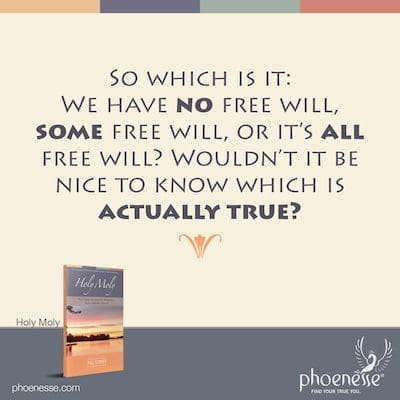

Free will is a topic of great confusion for many. So which is it? Door Number One: people have no free will whatsoever—it’s all fate or destiny. Door Number Two: we only have free will, and it’s all free will. Or Door Number Three: maybe some things are determined by free will while others are not. Wouldn’t it be nice to know which is actually true?
For someone who believes only in this present life and not in an existence before or after it, there would not seem to be any choice in determining where one is born, whether you’re a boy or a girl, or where, when and how you will die. There could also be no big plan for how certain phases of your life will unfold. That’s Door Number One.
But for someone who feels, knows and has experienced the truth of the Law of Cause and Effect and of reincarnation, that point of view couldn’t possibly be correct. For this person, there is an awareness that there’s a Big Plan. And although people have free will, we may temporarily have our wings clipped due to factors determined by us in our previous lives. Such factors are the effects of causes that we ourselves have set in motion. This is the winner: Door Number Two.
Here’s an example of what this might look like. Let’s say someone is a murderer. This person has committed a crime against God as well as against human law. So this person is apprehended and put in jail. But now let’s say the person has amnesia, and can’t remember what they did. Even if the murderer is told they did such-and-such, they have forgotten it. But that doesn’t altar the facts one iota that they committed the crime.
To the prisoner, all this will seem very unjust indeed. The past actions may be hidden from their view, but they happened nonetheless. This imprisonment is a creation of free will that’s had to work its way through the time lag of cause and effect.
Bottom line, wherever your free will seems to not be working in your best interest, it is due to causes you have brought about, even though you can’t remember them. The flip side of this is that wherever you can use your free will to your advantage, you have set those causes into motion too. Whether this all takes place in one lifetime doesn’t change this Law of Cause and Effect, which when it happens over lifetimes is also called karma. The upshot is, at one time, you have freely chosen to act and think in a way that brought about the results that are your current life situation.
Every single action, thought and feeling produces a result. Some show up quickly, so it’s easier to connect the dots. Others take the long way. Regardless, nothing happens in a person’s life for which that person is not responsible. Fate is the word we use to describe what happens to us when we have completely blanked on how we’ve sown those seeds ourselves.
And so that would be a No to Door Number Three and the question of whether free will, perhaps, only exists some of the time. And Door Number One then? Also a No. We so totally have free will. But that doesn’t mean we can do or think whatever we please without causing any effect. This world that God created runs on an infinite number of laws. We, God’s children, get to choose to keep or not keep these laws. And we’ve had this choice for a very, very long time. Like, since way before Earth came into existence.
So what happens when we choose to keep them? Well, this leads down the road of happiness, love, harmony, light and supreme wisdom. Because God, who is perfect, can’t create anything but perfection. Yet, if God were to force us to follow his laws, well, that just wouldn’t be very Godlike now, would it. This would totally fly in the face of the basic Law of Free Will.
It simply can’t be beauty, harmony, wisdom, bliss and love if it’s forced on us, against our will—and also against our own recognition of the wisdom and perfection of God’s laws. Because that would be a God of slavery, not a God of freedom, even if we would be very happy slaves.
So every created creature—human or spirit—gets to choose: do we want to live according to God’s laws or not? Now here is an important key to understanding how evil, darkness and cruelty have come into being. But God is not the one who created evil. No, God created us with the capacity to freely choose. We can follow his happy laws and live happily ever after. Or not. And when that happened, it created what is known as the Fall of the Angels.
Listen and learn more.
Read Holy Moly, Chapter 1: The Good Lord Willing


